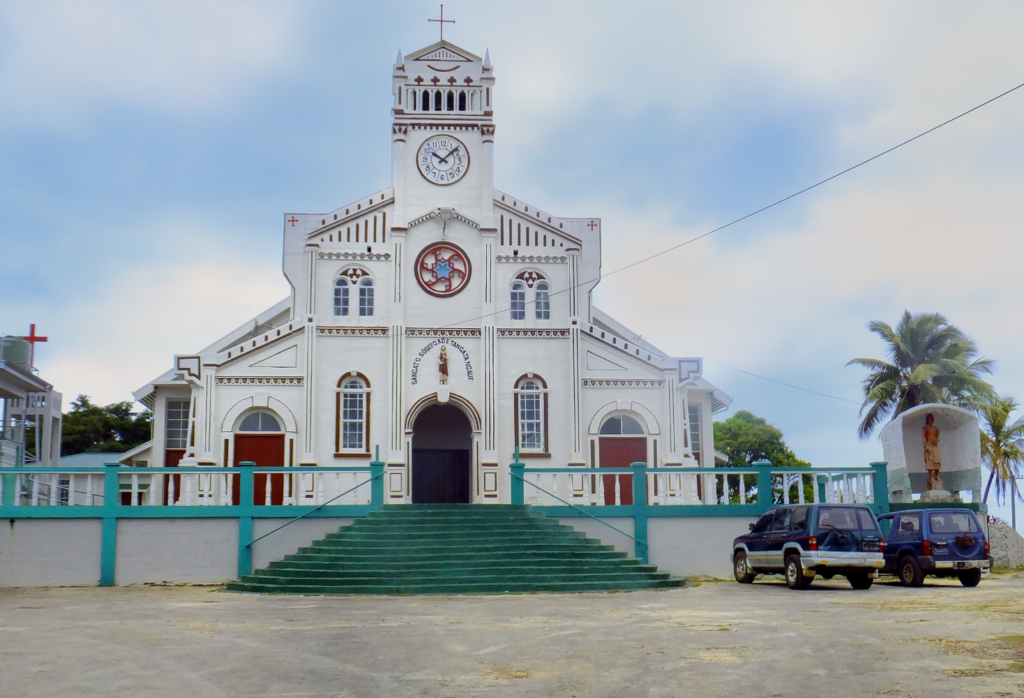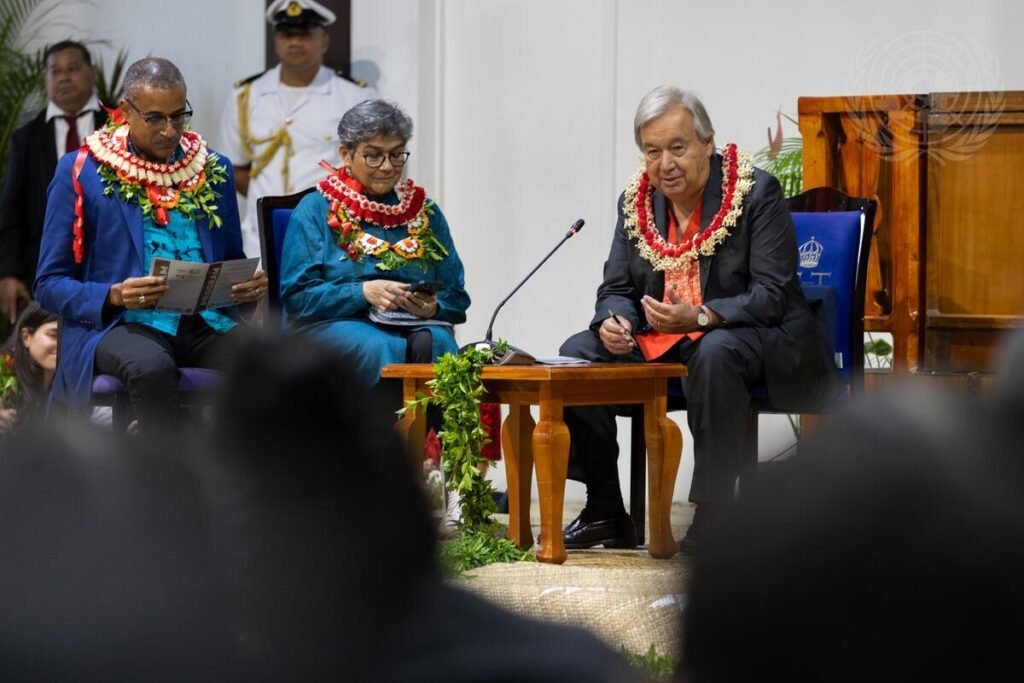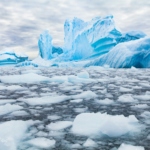“`html
António Guterres’ Visit and Key Messages
United Nations Secretary-General António Guterres recently visited Tonga to attend the Pacific Island Forum Leaders Meeting. During this high-profile visit, Guterres articulated a strong message focused on climate action and the urgent need to address the escalating climate crisis. His remarks were a clarion call for the international community to take immediate and decisive measures to combat global warming.
In his address, Guterres underscored the disproportionate impact of climate change on the Pacific Islands. Despite being among the smallest contributors to global emissions, these islands are some of the earliest and most severely affected victims of the climate crisis. Guterres highlighted that the survival of these islands is at stake, with rising sea levels, severe weather events, and disrupted ecosystems threatening their existence. He emphasized the moral and practical responsibility of larger, more industrialized nations to lead the charge in reducing greenhouse gas emissions.
Guterres pointed out the irony and injustice faced by the Pacific nations, which, while having a minimal carbon footprint, endure the most intense repercussions of the deteriorating climate. He called upon the big polluters to immediately cut emissions, warning of catastrophic global consequences if adequate action is not taken. This dire warning was aimed at galvanizing global leaders into taking swift, concerted efforts to prevent further environmental degradation.

The Secretary-General also praised the Pacific Islands for their resilience and proactive approaches to climate adaptation and mitigation. He noted that while measures taken by these nations can serve as useful models, they are insufficient on their own to combat the global scale of the problem. Guterres reiterated that collaboration and solidarity are crucial in overcoming the climate emergency, urging wealthier nations to support the vulnerable regions more vigorously through financing, technology transfer, and capacity-building initiatives.
In conclusion, Guterres’ visit to Tonga was a significant event that brought attention to the severe impacts of climate change on the Pacific Islands and presented a compelling argument for global cooperation and immediate action to avert a worldwide climate catastrophe.
The Plight of Pacific Island Nations
The Pacific Island nations, including Tonga, are among the most affected by the ongoing climate crisis, a situation António Guterres, the United Nations Secretary-General, terms an ‘enormous injustice.’ These nations bear the disproportionate brunt of climate change impacts, despite contributing minimally to global carbon emissions. Recent UN reports underline the dire circumstances faced by these vulnerable countries, emphasizing that rising sea levels, ocean warming, and acidification are severely threatening their existence.
In particular, Guterres highlighted the rapid escalation of sea levels in his recent visit to Tonga. Data from the Intergovernmental Panel on Climate Change (IPCC) reveals that sea levels have been rising at an accelerated rate due to global warming. Consequently, coastal erosion, saltwater intrusion, and more frequent and severe flooding events have become the unsettling reality for Pacific Island residents. The increased vulnerability of these islands to extreme weather events like cyclones only exacerbates their precarious situation.

Furthermore, the warming and acidification of the oceans present additional challenges. According to a United Nations Environment Programme (UNEP) report, the ocean has absorbed about 30% of the emitted anthropogenic carbon dioxide, leading to increased acidification. This phenomenon has detrimental effects on marine ecosystems, undermining the livelihoods of communities that depend on fishing and tourism. Indeed, Guterres pointed to these disruptions in his speech, stressing that the region’s unique biodiversity and marine resources are at critical risk due to the relentless emission of greenhouse gases from fossil fuels.
Concrete examples drawn from Guterres’ visit illustrate these points vividly. He noted instances of coastal villages in Tonga and other Pacific Islands that have already been forced to relocate due to rising waters. The unprecedented warming of the ocean surrounding these islands has led to coral bleaching, which gravely affects the marine habitats these communities rely on. These disruptions underscore an urgent call for international solidarity and immediate, robust climate action to support the Pacific Islands in their fight against the climate crisis and secure their future.
The State of the Climate in the South West Pacific
The latest findings from the World Meteorological Organization’s ‘State of the Climate in the South West Pacific’ report paint a stark picture of the challenges facing this vulnerable region. The ‘triple whammy’ of accelerated sea-level rise, ocean warming, and acidification forms the crux of the climate crisis in the South West Pacific. According to the report, the average sea level in the region has risen by approximately 9.4 centimeters over the past 30 years. Alarming localized figures reveal that some areas have experienced up to a 15-centimeter rise, underscoring the uneven and severe impact of global warming on these low-lying islands.

Furthermore, the warming of the ocean is another critical issue highlighted in the report. The South West Pacific is witnessing significant increases in sea surface temperatures, which exacerbate the frequency and intensity of extreme weather events like cyclones and contribute to coral bleaching. Coral ecosystems, vital for marine biodiversity and coastal protection, are particularly susceptible to the dual threats of warming waters and ocean acidification. Ocean acidification, driven by the absorption of excess atmospheric carbon dioxide, affects marine life, from the smallest plankton to larger fish and invertebrates, disrupting entire marine food webs and fisheries that local communities depend on.
Sea level rise in Tonga has been a critical concern over the past two decades, with the rate of increase being significantly higher than the global average. From 2000 to 2023, sea levels in the Pacific region, including Tonga, have been rising at a pace faster than the global average, which is about 3.4 millimeters per year. Specifically, in Tonga, the sea level has been rising at an average rate of approximately 6 millimeters per year over the past few years.
This trend has led to increased coastal flooding, erosion, and other environmental challenges, placing immense pressure on Tonga’s infrastructure, economy, and the well-being of its inhabitants. The impacts are especially pronounced given that many of the islands in Tonga are just a few meters above sea level, making them highly vulnerable to even minor increases in sea level.
For instance, in 2023 alone, Tonga experienced multiple instances of coastal flooding, with severe implications for agriculture and freshwater resources. This ongoing rise is expected to continue for centuries, contributing to more frequent and intense climate-related disasters in the region.
The information above is based on reports from the World Meteorological Organization (WMO) and the Asian Development Bank (ADB), which have been actively monitoring and assessing the impact of climate change on Pacific Island nations like Tonga..
UN Secretary-General António Guterres, during his visit to Tonga, emphasized the urgency of addressing these climate challenges. He pointed out how accumulating greenhouse gases are “cooking our planet,” leading to a hotter and less stable future. With oceans absorbing a significant portion of this trapped heat, the impact on sea levels and marine environments is profound. Guterres’ remarks underscore the necessity for global cooperation and swift action to mitigate these alarming trends and protect vulnerable regions like the South West Pacific.
Collectively, the data and the Secretary-General’s observations render an urgent call to action. Addressing the root causes of climate change through sustained international efforts is crucial to safeguarding the future of the South West Pacific and other similarly affected regions worldwide.
Themes of Resilience and Future Action
The Pacific Island Forum’s theme of transformative resilience resonated deeply during UN Secretary-General António Guterres’ visit to Tonga. Guterres highlighted the sentiments of Mr. Sikulu, a Tongan representative, who eloquently expressed the resilience and joy intrinsic to Tongan culture, especially amidst adversity. This powerful commentary underscores the strength of the Tongan people as they confront the multifaceted challenges posed by the climate crisis.
The forum’s opening day was marked by heavy rains and an earthquake, stark reminders of the immediate and severe impacts of global warming on Pacific Island nations. These events symbolized the theme’s significance, emphasizing that transformative resilience is not merely a concept but a lived reality for the people of Tonga and the broader Pacific region.
Guterres called for the leaders of nations, particularly those from Australia and New Zealand, to witness firsthand the profound challenges and extraordinary resilience of Pacific Island communities. His appeal was an urgent reminder that unity and solidarity at the international level are imperative in the fight against climate change. The Secretary-General’s visit underscored that the resilience of Tongan culture is both a beacon of hope and a call to action.

The commentary also stressed the necessity for increased international cooperation and support. It is critical for countries around the world to not only recognize the existential threats faced by Pacific Island nations but also to take meaningful actions to mitigate these threats. Guterres’ words prompted a reflection on the shared responsibility to combat climate change and foster sustainable, resilient futures for vulnerable communities globally. Through solidarity and concerted action, the world can help ensure that the vibrant resilience of Tongan culture continues to thrive despite the challenges posed by the climate crisis.



